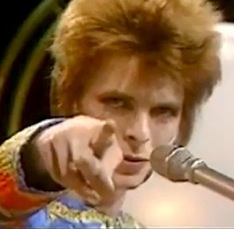➤ 1980, The year the Blitz Kids took their first steps into the headlines
Posted on 21 August, 2010

Uncannily setting the pace for the New Romantics at the dawn of 1980: Kim Bowen here attends the party at Witchity strictly in “fancy dress” as the first Queen Elizabeth, accompanied by actor David Claridge in an even bigger ruff. All had been hired from the costumiers Berman’s & Nathan’s for a proposed film shoot with Molly Dineen which was cancelled at short notice. When George O’Dowd discovered Kim at the Warren Street squat costumed to the hilt as white-faced Gloriana and suddenly available for the day, he insisted they tour the streets of London, he in his yellow face and loud blue tartan outfit, berating builders and van drivers who shouted obscene abuse. According to Kim: “We visited every person we knew in London that day.” (Photograph © by Ted Polhemus/PYMCA)
YEARS
ON
❚ “WHAT WILL YOU BE WEARING IN THE 80s?” This was the question posed by Steve Strange – the greeter on Tuesday nights at the Blitz Club since it opened in Covent Garden in February 1979. He was announcing the theme of the one-off costume party he was to throw at Witchity’s in Kensington High Street. At the dawn of a new decade, as co-founder of a unique London phenomenon, an elite club-night for under-21 posers, he was challenging the Blitz Kids to play at futurology. Tuesdays at the Blitz were, according to St Martin’s School of Art wordsmith Perry Haines, “like a cherry on the bland fashion cake”. His college contemporary Iain R Webb enthused about “a little gang who still had that edge of not fitting in – people being different the same way”.
Followers of Rusty Egan’s electro-diskow music, which he pioneered as the Blitz Club deejay, came to Witchity dressed as shiny robo-futurists. Stepping from another Tardis, however, the Queen of the Blitz Kim Bowen decided to come as a full-blown Gloriana – Good Queen Bess herself, in a high stiff Tudor ruff and huge layered court gown. Lo! The Pose Age was well and truly declared open. During the Blitz Club’s first mould-breaking year media coverage had been zero to minimal. Then with one regal gesture, the New Romantics were only a tabloid headline away from being born. And the media floodgates opened.
Kim, a fashion student who dropped out from St Martin’s along with her bestie Lee Sheldrick at Easter 1980, said of Witchity long after: “We were in fancy dress that night, however. We were planning on making a film with Molly Dineen and [the actor] David Claridge and I had rented these outfits. We didn’t walk around like this: our other outfits were more personal, more individual, more creative.” Kim shares an important insight here: fancy dress for a Blitz Kid was not the same as creative dressing up. One of the “outfits” Kim was soon walking around in was an exceedingly long length of surgical bandage, as you can see below.
 Some say Steve’s futurology party took place on New Year’s Eve 1979; but my Evening Standard report on 4 Feb puts it at the end of January, having been billed as an 80s Ball. In the January weeks between the two dates, Chris Sullivan, another St Martin’s fashion wag, split the ranks by opening a rival poser club-night in the cellars of the St Moritz restaurant in Soho for what he has called “the more alert end of the Blitz crowd” – in other words, the hardcore fashionistas. Almost simultaneously, the theatrical costumier Charles Fox in Tavistock Street sold off its stock in a closing-down sale which instantly inspired a tidal wave of retro mania in clubland.
Some say Steve’s futurology party took place on New Year’s Eve 1979; but my Evening Standard report on 4 Feb puts it at the end of January, having been billed as an 80s Ball. In the January weeks between the two dates, Chris Sullivan, another St Martin’s fashion wag, split the ranks by opening a rival poser club-night in the cellars of the St Moritz restaurant in Soho for what he has called “the more alert end of the Blitz crowd” – in other words, the hardcore fashionistas. Almost simultaneously, the theatrical costumier Charles Fox in Tavistock Street sold off its stock in a closing-down sale which instantly inspired a tidal wave of retro mania in clubland.
Until then, fabulous Blitz Kid looks had been imaginatively shaped from charity shops and the ex-army surplus store Laurence Corner in Euston, not far from their squats. Iain Webb, these days a fashion editor of long-standing, reported in a review of We Can Be Heroes: “Suddenly a host of medieval knights, Victorian ladies, swooning maidens and swarthy noblemen could be found knocking back the snake-bite or Pernod-and-black at the bar of the Blitz.”

Core Blitz Kids captured at their Covent Garden club for the Sunday Times Magazine, dated 27 April 1980: Back row, George O’Dowd, Vivienne Lynn, Chris Sullivan, Theresa Thurmer. Front, Kim Bowen and one of Steve Strange’s favourites called Steve in the zhooshed riah. Photo by Derek Ridgers
Webb continues: “This ragbag of clothes became the visual soundtrack to our lives. A few designer labels flourished, namely PX [a boutique that boasted Steve Strange as a sales assistant and, later, milliner Stephen Jones in the basement], Willy Brown’s Modern Classics and, of course, Vivienne Westwood (who along with Malcolm McLaren had already styled the punks and now pirates). And then there were the new breed of wannabe designers such as David Holah (who dressed both men and women in his cheap and vaguely Grecian muslin chemises) or Melissa Caplan, who clad Toyah Willcox and the Spandau Ballet boys in tabards and tops that tied you up like a mad person (after bondage pants, anything made sense).
“There was also Judith Frankland who helped fashion the monochromatic religious looks that Bowie hijacked, after a visit to the Blitz [in July], for his Ashes To Ashes video. The circle was complete. The followers had costumed their hero and the asylum was up for grabs.”
A new appetite for retro sounds also kicked in. Initially St Moritz’s music evoked interwar Berlin cabaret but, as a backlash to the Blitz’s electro-diskow, this was quickly augmented by glamorous Hollywood soundtracks and Sinatra, not to mention Joel Grey’s hit stage musical Cabaret. As lush tunes, wing-collared dandyism and corseted vamps spread through UK clubland, “New Romantics” was of course the last phrase on anybody’s lips.

Christena’ed by the Daily Mirror: the headline that created the Blitz Kids epithet in March 1980. Richard Wakefield sports the haircut heading into orbit
“ The competition pushed you on, especially Lee Sheldrick. At the Warren Street squat you might change what you were going to wear EIGHT TIMES on a Tuesday to try to outdo everyone else
at the Blitz ” – Stephen Linard, fashion student

Doyennes among the Blitz Kids in 1980: Kim Bowen and Stephen Linard stamp themselves on that week’s zombie leitmotif. (Photographed © by Derek Ridgers)
Linard’s Alternative student show gives
Goths their archaic name

St Martin’s Alternative Fashion Show 1980: Stephen Linard’s “Neon Gothic” collection worn here by Myra in lace hat and Michele in skullcap, both by Stephen Jones

St Martin’s Alternative Fashion Show 1980: Stephen Linard’s “Neon Gothic” collection modelled by his most stylish friends with Lee in white as a space-age pope

St Martin’s Alternative Fashion Show 1980: Stephen Linard’s “Neon Gothic” collection modelled by George, Fiona and Julia

Stephen Linard sporting a wooden cross by Dinny Hall and the rabbinical outfit that would catch Bowie’s eye in July 1980
❏ Pushing the boundaries of excess at St Martin’s School of Art was fashion student Stephen Linard, an outrageous character who yearned to be the star of every street or room he graced. Each year second-year students organised an unofficial Alternative Fashion Show but in May 1980, when it was coordinated by Perry Haines, the college’s resoundingly prim middle-class students were eclipsed after Linard sent out his sensational “Neon Gothic” collection – a stylish collision of Space 1999 meets liturgical Gothic meets the masonic livery displayed in shops which served the Freemasons’ Hall just along the street from the Blitz.
When the lights went up on these elegant black garments – modelled by his startling friends from the Blitz Club [above], strutting to the Human League’s newest release, Empire State Human – the audience erupted in cheers. Onstage were the then-unknown George O’Dowd sporting a soar-away post-punk mullett atop sharp grosgrain suit with dog collar, Michele Clapton and Myra Falconer wearing risen-from-the-dead pallor and emphatic eye sockets beneath shaven heads, along with Fiona Dealey and Julia Fodor (today a Princess), all of them cutting stark silhouettes in strongly tailored vestments. All were accessorised with religious motifs and emanated a curious holocaust chic.
Finally, all in white as what Linard calls a “space-age pope”, came Lee Sheldrick, the gifted eminence gris behind so many other students’ creations. Modelling a white silk grosgrain suit with cardigan-style flared back and straight-cut trousers, Lee had also shaved his head bald the week before to become the embodiment of Nosferatu the Vampyre. It was no coincidence that Werner Herzog’s film of that name had been sweeping Europe for the past year. This moment can surely be claimed as the catalyst that consolidated a look and a name for the UK’s nascent Goth music scene that had been gestating through the post-punk vacuum. Yet neither of its main representatives, Siouxsie and the Banshees, nor Bauhaus – whose debut single Bela Lugosi’s Dead had been lurking in the independent UK charts for months – laid claim to the G word, in much the same way nobody else ever admitted being a “New Romantic”.
Only as 1980 matured did Andy Gill at the NME weekly music newspaper apply the word “Gothick” to a Bauhaus review. [For the definitive history of Goth visit Pete Scathe’s enduring website.]

Klaus Kinski as Count Dracula in Werner Herzog’s 1979 film. . . Blitz Kid Lee Sheldrick reincarnated for Linard’s Neon Gothic fashion show, 1980

Three Blitz Kids with polished pates: Lee Sheldrick wearing Modern Classics, Myra and Michele Clapton in their own improvisations – captured for a Sunday Times Magazine feature about Soho in November 1980
Linard himself had been posing around in clerical collar and crucifix emblems, and the week after the Alternative show a third image-led club-night was launched at Hell in Covent Garden with this invocation on its invitation: “You are invited to burn in Hell – demoniacal dress is desired.” This time Steve Strange presided as The Pope with Christos Tolera as The Devil and Julia as Morticia, with Linard as a Bishop in a green cassock.
Almost immediately a second strong collection of black pseudo-ecclesiastical gowns added power to the Goth trend with Judi Frankland’s designs for the Ravensbourne College degree show at the Café Royal. Judi was probably the craziest of all the Blitz Kids (a competitive accolade, this) who was so obsessed with the habits of nuns and The Sound of Music in particular that she adapted these silhouettes in a glamorous evocation of the 50s in black and white taffeta, brocade, velvet and satin.
By a lucky coincidence, one of these outfits caught the eye of David Bowie on his most famous visit to the Blitz Club on 1 July 1980. Not only were four Blitz Kids including Steve Strange recruited to provide the chorus two days later in his music video for Ashes to Ashes, being shot on the beach at Hastings by director David Mallet, but also three out of the four wore Judi’s degree-show creations with hats by Fiona Dealey and Richard Ostell. Most spectacular was the black wedding dress worn by Strange and crowned with a Stephen Jones head-dress and veil made of stiffened lace on a metal frame.
These kids, these clubs, these events and that video have each become icons of the movement which by the ninth month of 1980 the weekly music magazine Sounds finally endorsed with its huge headline: The New Romantics.

Bowie’s chorus at Hastings, July 1980: Paused on the beach during filming of Ashes to Ashes, from the left, Steve Strange, Darla Jane Gilroy, Judi Frankland and Elise Brazier keeping warm in a mac. When they got back to London, they all went clubbing at Hell
Artist as ready-made, always slightly askew

Individualists: Melissa Caplan and her legendary spike, with Myra Falconer in white face. (Picture © by Derek Ridgers)
❏ THE CULTURAL MAGAZINE TITLED ZG was launched in 1980 by St Martin’s tutor Rosetta Brooks, to monitor a rapidly evolving landscape. In it she observes: “The loss of mainstream has given the impression of a culture of ghettoes. . . Self-consciously borderline activities have grown up which aim to work between ‘styles’. . . The consumption of a fashion image is no longer the simple identification with the lifestyle to which one aspires. It is tending to become a symbolic articulation of one image in relation to many images.”
 On its centre pages ZG surveys the “cinematic stereotypes” of what it headlined as Blitz Culture. It pictures Linard’s “Neon Gothic” collection and observes: “There is something priestly (almost saintly) about the dedication with which the inner circle bear the burden of style. Steve Strange’s Polaroid [fore-runner of today’s selfie] may have been elevated to the status of instrument of ordination but he can’t resist handing it round to his flock.”
On its centre pages ZG surveys the “cinematic stereotypes” of what it headlined as Blitz Culture. It pictures Linard’s “Neon Gothic” collection and observes: “There is something priestly (almost saintly) about the dedication with which the inner circle bear the burden of style. Steve Strange’s Polaroid [fore-runner of today’s selfie] may have been elevated to the status of instrument of ordination but he can’t resist handing it round to his flock.”
Rosetta compares self-consciously styled poses to “street theatre ultimately extended into continuous performance as a post-punk embodiment of Gilbert and George in one person (the individualist).” Each poser, she writes, is a ready-made. “For the poser it is not so much the style of appearance which in itself is important, eg, achieving a perfect 50s revival look, but that the overall ‘look’ is ambiguous, even askew.”
“ Each poser is a ready-made ”
She pinpoints a sign the poser is giving to the world: “What I’ve always called the gap between intention and effect. . . Something is ironic [about] the fact that what you intend never comes out like you intend it. The poser makes this gap his/her point of attraction. . . and perhaps the poser represents Angela Carter’s beautifully exaggerated definition of style as ‘the presentation of the self as a three-dimensional art-object to be wondered at and handled’.”
Oh yes, Guy Debord’s burgeoning “society of the spectacle” re-ignited by the 1980s rapidly became meat and drink to the theorists and semioticians such as Roland Barthes, whose paeon to nightclubbing makes a brilliantly considered read elsewhere at Shapers of the 80s.
Spreading the word
through clubland
Update posted on 7 September 2014
❏ THIS ONLY KNOWN VINTAGE FOOTAGE of the original Blitz Kids turning their club into a fashion runway in its heyday was discovered while Spandau Ballet were researching their documentary biopic Soul Boys of the Western World, being released in the UK in October 2014. Most of the black-and-white stills in this sequence were taken by Shapers of the 80s. The highlight is the horde of Blitz Kids descending on Sloane Square station to board a Circle Line underground train [also seen in the video above] to celebrate Steve Strange’s 21st birthday in May 1980, alighting at those stations on the line which had bars on their platforms at that time. Plus ça change.

August 1980: St Martin’s graduate Iain R Webb organises No Sacrifice, a modest runway show for art-school refusniks such as Melissa Caplan. Here at Chelsea’s Chenil Gallery her Pallium Products are modelled by Blitz Kids Myra Falconer, John Maybury and Lee Sheldrick. (Photo: Mick Hurd)
Handy links to the era of the New Romantics
✧ Steve Strange’s page at Facebook
✧ Rusty Egan at Facebook
✧ Princess Julia at Facebook
✧ George O’Dowd at Facebook
✧ The indefatigable Ultravox
✧ Duran Duran, bless
✧ 21 albums later, Depeche Mode stake their own claim to the Universe
✧ Sade, the band
✧ Stephane Raynor’s photos of PX at Facebook
✧ All-Bowie search here at Shapers of the 80s
✧ Danilo Monzillo’s exhaustive Blitz Kids compendium

Les incroyables: Greg Davis, Stephen Linard, Clare Thom, Lee Sheldrick and Fiona Dealey on the town 1981. Photo © Shapersofthe80s
TAGS – New Romantics, Blitz Kids, Blitz Club, London, posers, Swinging 80s, Kim Bowen, Julia Fodor, Steve Strange, Rusty Egan, Chris Sullivan, Perry Haines, Iain R Webb, St Moritz, Stephen Linard, Michele Clapton, Clare Thom, Lee Sheldrick, Fiona Dealey, Melissa Caplan, Stephen Jones, Judith Frankland, Greg Davis, Myra Falconer, Christos Tolera, John Maybury, Willy Brown, George O’Dowd, Toyah Willcox, Spandau Ballet, Sade, Richard Ostell, David Claridge, Stephane Raynor, Rosetta Brooks, David Mallet, Klaus Kinski, Charles Fox, Derek Ridgers, Goth, video










